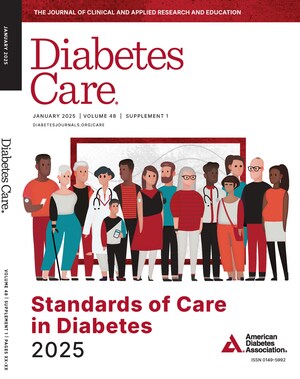Late Breaking Posters Reveals New-in-tech Data: AI Algorithms for Diabetic Retinopathy Progression Risk Estimation and First-of-its-Kind Device for Insulin Infusion and Glucose Sensing
SAN DIEGO, June 23, 2023 /PRNewswire/ -- Today, findings from two studies showcase groundbreaking technology and the latest diabetes developments related to glucose control and diabetic retinopathy. Both studies were presented as late-breaking posters at the 83rd Scientific Sessions held by the American Diabetes Association® (ADA) in San Diego, CA.
Data from these new technologies comes at a time when smart technology is on the rise, including artificial intelligence (AI), digital health technology and novel medical devices, helping to advance diabetes care and quality of life.
"We have seen many advancements over the years in the technology available to help manage and treat diabetes. Recently, AI and medical devices are helping to drive this movement, "said Robert Gabbay, MD, PhD, chief scientific and medical officer for the ADA. "We are excited that novel technology is at the forefront of this year's Scientific Sessions as we highlight the incredible developments that can help transform diabetes care."
Novel Glucose Sensing and Delivery Device for Type 1 Diabetes
Automated insulin delivery (AID) systems, commonly known as an artificial pancreas, are a transformative technology for individuals with diabetes that require intensive insulin therapy. AID delivers insulin through insulin pumps based on continuous sensor glucose data. However, today's technology requires multiple devices and separate insertions for the glucose sensor and insulin delivering cannula because the preservatives in insulin can interfere with the function of currently available sensors. The current, multi-device systems make for a complex user experience that is exacerbated by asynchronous device replacement schedules.
SynerGTM is a dual-function glucose sensing-insulin delivery device developed by Pacific Diabetes Technologies that simplifies diabetes management. The SynerGTM glucose sensor has a warm-up time of less than 30 min and also synchronizes replacement schedules for insulin delivery and glucose measurement functions. The ultimate goal at PDT is to commercialize a seven-day CGM-infusion set as the weekly replacement schedule is a convenient cadence.
Feasibility of a Prototype Dual Function Glucose Sensing Insulin Delivery Cannula in People with Type 1 Diabetes, showed the feasibility of the first single through-the-skin device combining glucose sensing and insulin delivery functions (SynerG).
The study enrolled 24 adults with type 1 diabetes on insulin pump therapy (IPT). The device was inserted subcutaneously in the anterior abdomen and attached to the pump, following a 48-hour run-in using a commercially available infusion set with a study pump. A single calibration was performed during the less than 30-minute warm up time. A standardized meal was eaten 60 minutes post-insertion. Blood glucose was measured every 10 minutes for 60 minutes before and every 15 minutes for 4 hours after the meal. The study evaluated SynerGTM sensor accuracy, insulin infusion site function, and user tolerability.
Findings for 24 participants indicate that insulin did not interfere with the function of the glucose sensor and demonstrated accuracy in the measurement of glucose. In addition, insulin was delivered reliably to participants.
"We believe these findings represent a potentially significant step forward in the management of glucose levels for those living with diabetes with the feasibility of a single insertion subcutaneous device able to both sense glucose and infuse insulin. We envision a device like this will help to minimize the burden of care and associated psychological distress for those living with diabetes who require insulin," said Professor David O'Neal MD, Professor with the University of Melbourne Department of Medicine at St. Vincent's Hospital, Senior Consultant Endocrinologist with the Department of Endocrinology at St. Vincent's Hospital.
Using AI to Predict Diabetic Retinopathy Progression
By 2050, the number of people with diabetic retinopathy is estimated to nearly double, affecting over 14 million Americans. Estimating the risk of diabetic retinopathy (DR) progression is clinically difficult due to the task drawing upon medical knowledge and clinical experience that may vary between clinicians. The current DR severity scales inform clinicians on the progression risk providing recommendations for follow-up and treatment. This study sought to evaluate how the use of AI algorithms may improve this process.
The study, Identifying the Risk of Diabetic Retinopathy Progression Using Machine Learning on Ultrawide Field Retinal Images, examined the use of AI algorithms to improve the process of estimating the risk of DR progression. In this study, the authors developed and validated machine learning (ML) models for DR progression from ultrawide field (UWF) retinal images, which were labeled for baseline DR severity and progression.
Findings show the AI prediction for 91% of the images were either correct labels or were the labels with greater progression than the original labels. These findings demonstrate the accuracy and feasibility of using machine learning models for identifying DR progression developed using UWF images.
"Currently, estimating the risk of DR progression is one of the most important, yet difficult tasks for physicians when caring for patients with diabetic eye disease," said Paolo S. Silva, MD, Co-Chief of Telemedicine, Beetham Eye Institute, Joslin Diabetes Center. Associate Professor of Ophthalmology, Harvard Medical School. "Our findings show that potentially, the use of machine learning algorithms may further refine the risk of disease progression and personalize screening intervals for patients, possibly reducing costs and improving vision-related outcomes."
Research presentation details:
- David O'Neal, MD will present his late breaking poster, Feasibility of a Prototype Dual Function Glucose Sensing Insulin Delivery Cannula in People with Type 1 Diabetes, during the General Poster Session on Saturday, June 24 from 11:30 –12:30 PM PST.
- Paolo S. Silva, MD will present his late breaking poster Identifying the Risk of Diabetic Retinopathy Progression Using Machine Learning on Ultrawide Field Retinal Images, during the General Poster Session on Saturday, June 24 from 11:30 –12:30 PM PST.
About the ADA's Scientific Sessions
The ADA's 83rd Scientific Sessions, the world's largest scientific meeting focused on diabetes research, prevention, and care, will be held in San Diego, CA on June 23–26. More than 12,000 leading physicians, scientists, and health care professionals from around the world are expected to convene both in person and virtually to unveil cutting-edge research, treatment recommendations, and advances toward a cure for diabetes. Attendees will receive exclusive access to thousands of original research presentations and take part in provocative and engaging exchanges with leading diabetes experts. Join the Scientific Sessions conversation on social media using #ADA2023.
About the American Diabetes Association
The American Diabetes Association (ADA) is the nation's leading voluntary health organization fighting to bend the curve on the diabetes epidemic and help people living with diabetes thrive. For 82 years, the ADA has driven discovery and research to treat, manage, and prevent diabetes while working relentlessly for a cure. Through advocacy, program development, and education we aim to improve the quality of life for the over 133 million Americans living with diabetes or prediabetes. Diabetes has brought us together. What we do next will make us Connected for Life®. To learn more or to get involved, visit us at diabetes.org or call 1-800-DIABETES (1-800-342-2383). Join the fight with us on Facebook (American Diabetes Association), Spanish Facebook (Asociación Americana de la Diabetes), LinkedIn (American Diabetes Association), Twitter (@AmDiabetesAssn), and Instagram (@AmDiabetesAssn).
Contact: Rebecca Fisher, 703-253-4918,
SOURCE American Diabetes Association

WANT YOUR COMPANY'S NEWS FEATURED ON PRNEWSWIRE.COM?
Newsrooms &
Influencers
Digital Media
Outlets
Journalists
Opted In






Share this article